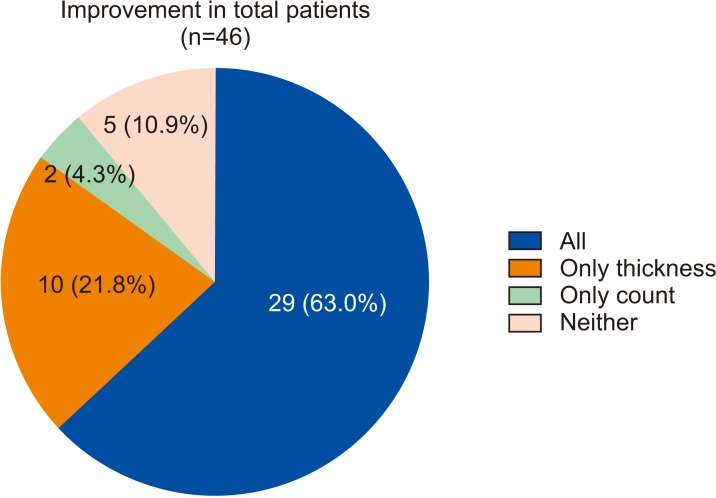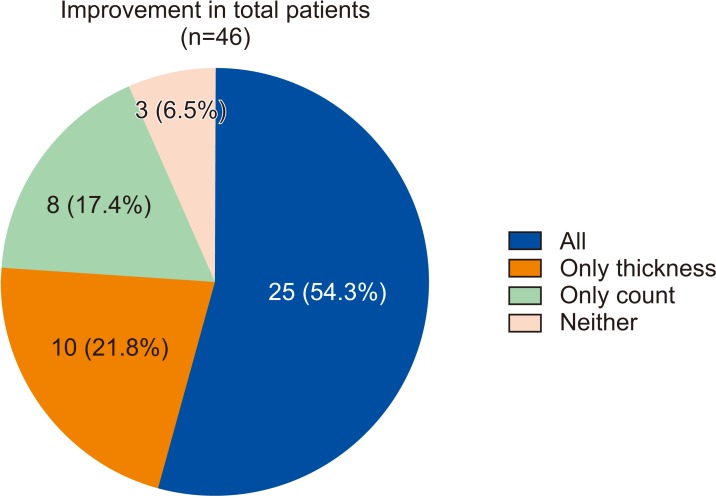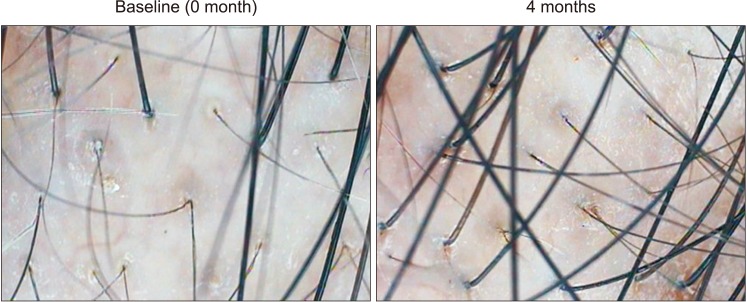World J Mens Health.
2020 Jan;38(1):95-102. 10.5534/wjmh.180119.
Do Kimchi and Cheonggukjang Probiotics as a Functional Food Improve Androgenetic Alopecia? A Clinical Pilot Study
- Affiliations
-
- 1Laboratory of Reproductive Medicine, Cheil General Hospital & Women's Healthcare Center, Dankook University College of Medicine, Seoul, Korea.
- 2Department of Urology, Cheil General Hospital & Women's Healthcare Center, Dankook University College of Medicine, Seoul, Korea. jtandro@cgh.co.kr
- 3Coenbio R&D Center, Seongnam, Korea.
- KMID: 2465414
- DOI: http://doi.org/10.5534/wjmh.180119
Abstract
- PURPOSE
Probiotic supplementation demonstrates beneficial effects on serum lipid profiles. We hypothesized that probiotics could benefit patients presenting with alopecia, secondary to improved blood flow to the scalp.
MATERIALS AND METHODS
Our study included men with stage II to V patterns of hair loss based on the Hamilton-Norwood classification and women with stage I to III patterns of hair loss based on the Ludwig classification. All patients were administered 80 mL of Mogut® (a kimchi and cheonggukjang probiotic product) twice a day. Hair growth and numbers were measured using the Triple Scope System® (KC Technology, Korea) at baseline and after 1 and 4 months of administration of a kimchi and cheonggukjang probiotic product.
RESULTS
At baseline, the mean hair count was 85.98±20.54 hairs/cm2 and the mean thickness was 0.062±0.011 mm in all patients (n=46). Hair count and thickness had significantly increased at 1 month (90.28±16.13 hairs/cm2 and 0.068±0.008 mm, respectively) and at 4 months (91.54±16.29 hairs/cm2 and 0.066±0.009 mm, respectively). In this study, we found that a kimchi and cheonggukjang probiotic product could promote hair growth and reverse hair loss without associated adverse effects such as diarrhea.
CONCLUSIONS
We suggest that the observed improvements in hair count and thickness resulted from initiation of the anagen phase in hair follicles in response to probiotics.
Keyword
MeSH Terms
Figure
Reference
-
1. Qi J, Garza LA. An overview of alopecias. Cold Spring Harb Perspect Med. 2014; 4:a013615. PMID: 24591533.
Article2. Jang SK, Kim ST, Lee DI, Park JS, Jo BR, Park JY, et al. Decoction and fermentation of selected medicinal herbs promote hair regrowth by inducing hair follicle growth in conjunction with Wnts signaling. Evid Based Complement Alternat Med. 2016; 2016:4541580. PMID: 27110266.
Article3. Kwon OS, Oh JK, Kim MH, Park SH, Pyo HK, Kim KH, et al. Human hair growth ex vivo is correlated with in vivo hair growth: selective categorization of hair follicles for more reliable hair follicle organ culture. Arch Dermatol Res. 2006; 297:367–371. PMID: 16328343.
Article4. Rile N, Liu Z, Gao L, Qi J, Zhao M, Xie Y, et al. Expression of Vimentin in hair follicle growth cycle of inner Mongolian Cashmere goats. BMC Genomics. 2018; 19:38. PMID: 29320989.
Article5. Choi JC, Uyama H, Lee CH, Sung MH. In vivo hair growth promotion effects of ultra-high molecular weight poly-γ-glutamic acid from Bacillus subtilis (Chungkookjang). J Microbiol Biotechnol. 2015; 25:407–412. PMID: 25502822.
Article6. Stefanato CM. Histopathology of alopecia: a clinicopathological approach to diagnosis. Histopathology. 2010; 56:24–38. PMID: 20055903.
Article7. Shapiro J. Clinical practice. Hair loss in women. N Engl J Med. 2007; 357:1620–1630. PMID: 17942874.8. McElwee KJ, Shapiro JS. Promising therapies for treating and/or preventing androgenic alopecia. Skin Therapy Lett. 2012; 17:1–4.9. Blumeyer A, Tosti A, Messenger A, Reygagne P, Del Marmol V, Spuls PI, et al. European Dermatology Forum (EDF). Evidence-based (S3) guideline for the treatment of androgenetic alopecia in women and in men. J Dtsch Dermatol Ges. 2011; 9 Suppl 6:S1–S57.
Article10. Gur S, Kadowitz PJ, Hellstrom WJ. Effects of 5-alpha reductase inhibitors on erectile function, sexual desire and ejaculation. Expert Opin Drug Saf. 2013; 12:81–90. PMID: 23173718.
Article11. Gordon KA, Tosti A. Alopecia: evaluation and treatment. Clin Cosmet Investig Dermatol. 2011; 4:101–106.
Article12. Campo D, Pisani A. Psychogenic alopecia. G Ital Dermatol Venereol. 2008; 143:283–287. PMID: 18833069.13. Renert-Yuval Y, Guttman-Yassky E. The changing landscape of alopecia areata: the therapeutic paradigm. Adv Ther. 2017; 34:1594–1609. PMID: 28646393.
Article14. Delamere FM, Sladden MM, Dobbins HM, Leonardi-Bee J. Interventions for alopecia areata. Cochrane Database Syst Rev. 2008; (2):CD004413. PMID: 18425901.
Article15. Shapiro J. Current treatment of alopecia areata. J Investig Dermatol Symp Proc. 2013; 16:S42–S44.
Article16. Gümüş N, Odemiş Y, Yılmaz S, Tuncer E. Effect of topically applied minoxidil on the survival of rat dorsal skin flap. Aesthetic Plast Surg. 2012; 36:1382–1386. PMID: 22955791.
Article17. Gupta AK, Charrette A. Topical minoxidil: systematic review and meta-analysis of its efficacy in androgenetic alopecia. Skinmed. 2015; 13:185–189. PMID: 26380504.18. Hagemann T, Schlütter-Böhmer B, Allam JP, Bieber T, Novak N. Positive lymphocyte transformation test in a patient with allergic contact dermatitis of the scalp after short-term use of topical minoxidil solution. Contact Dermatitis. 2005; 53:53–55. PMID: 15982234.
Article19. Motofei IG, Rowland DL, Georgescu SR, Tampa M, Paunica S, Constantin VD, et al. Post-finasteride adverse effects in male androgenic alopecia: a case report of vitiligo. Skin Pharmacol Physiol. 2017; 30:42–45. PMID: 28222425.
Article20. Poller WC, Berger A, Dreger H, Morgera S, Enke-Melzer K. Lipoprotein apheresis in patients with peripheral artery disease and lipoprotein(a)-hyperlipoproteinemia: 2-year follow-up of a prospective single center study. Atheroscler Suppl. 2017; 30:174–179. PMID: 29096834.
Article21. Shimizu M, Hashiguchi M, Shiga T, Tamura HO, Mochizuki M. Meta-analysis: effects of probiotic supplementation on lipid profiles in normal to mildly hypercholesterolemic individuals. PLoS One. 2015; 10:e0139795. PMID: 26473340.
Article22. Bouhanna P. Multifactorial classification of male and female androgenetic alopecia. Dermatol Surg. 2000; 26:555–561. PMID: 10848937.
Article23. Julious SA. Sample size of 12 per group rule of thumb for a pilot study. Pharm Stat. 2005; 4:287–291.
Article24. Mathipa MG, Thantsha MS. Probiotic engineering: towards development of robust probiotic strains with enhanced functional properties and for targeted control of enteric pathogens. Gut Pathog. 2017; 9:28. PMID: 28491143.
Article25. Lye HS, Kuan CY, Ewe JA, Fung WY, Liong MT. The improvement of hypertension by probiotics: effects on cholesterol, diabetes, renin, and phytoestrogens. Int J Mol Sci. 2009; 10:3755–3775. PMID: 19865517.
Article26. Tsai TY, Chu LH, Lee CL, Pan TM. Atherosclerosis-preventing activity of lactic acid bacteria-fermented milk-soymilk supplemented with Momordica charantia. J Agric Food Chem. 2009; 57:2065–2071. PMID: 19216552.
Article27. Hur KY, Lee MS. Gut microbiota and metabolic disorders. Diabetes Metab J. 2015; 39:198–203. PMID: 26124989.
Article28. Abularrage CJ, Sidawy AN, Aidinian G, Singh N, Weiswasser JM, Arora S. Evaluation of the microcirculation in vascular disease. J Vasc Surg. 2005; 42:574–581. PMID: 16171612.
Article29. Gubelin Harcha W, Barboza Martínez J, Tsai TF, Katsuoka K, Kawashima M, Tsuboi R, et al. A randomized, active- and placebo-controlled study of the efficacy and safety of different doses of dutasteride versus placebo and finasteride in the treatment of male subjects with androgenetic alopecia. J Am Acad Dermatol. 2014; 70:489–498.e3. PMID: 24411083.
Article30. Jeong SJ, Kwon GH, Chun J, Kim JS, Park CS, Kwon DY, et al. Cloning of fibrinolytic enzyme gene from Bacillus subtilis isolated from Cheonggukjang and its expression in protease-deficient Bacillus subtilis strains. J Microbiol Biotechnol. 2007; 17:1018–1023. PMID: 18050921.
- Full Text Links
- Actions
-
Cited
- CITED
-
- Close
- Share
- Similar articles
-
- A Clinical Study of Androgenetic Alopecia (III)
- Representative Trichoscopic Findings of Outpatients with Androgenetic Alopecia and Alopecia Areata
- Alopecia
- A Case of Combination Therapy with Finasteride and Low Dose Dutasteride in the Treatment of Androgenetic Alopecia
- A Clinical Study of Androgenetic Alopecia(IV)






